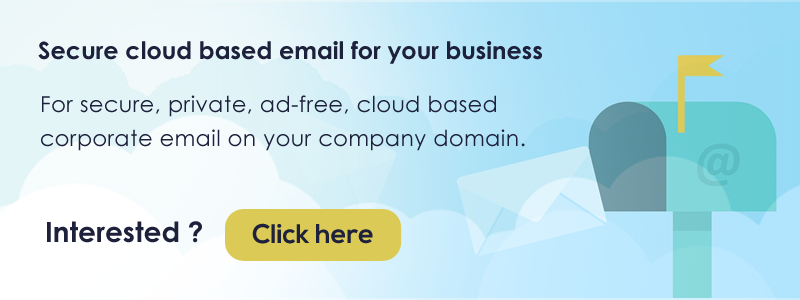Email is the backbone of any business and managing it well has become mission critical for the company. Gone are the days when SMEs fret over their changing email needs and availability of the email solutions that just fit your growing organisational needs. Large organisations no longer considered that on-premise hosted email solutions is the only option for confidentiality, control and better management of mails, and they do realize that it is just a ‘white elephant solution’. Today with the right cloud based email solutions, businesses Small, Medium or Large can focus more on their core business than spend time on their email solutions.
Here are the top 8 things that SMEs and large corporate must consider before choosing a business solution:
- 1. Cloud based email solution provider Cloud based email services have become increasingly popular over the past few years and we have come across several entities using them successfully for their business. The advantages provided by having hosted email solutions stand to benefit small-medium enterprises the most. There are no hard decisions involved since the amount of investments is very minimal and absolutely no hassle of deploying resources to manage these services. The costing model is also simple and straight forward which would help businesses manage their cash flow better and focus on their core activity. To conclude, Cloud based Email stands a good bet for small to medium enterprises to adopt with little risk.
- 2. High availability Ask any business leader what he feels is an acceptable amount of email downtime, and he will most likely respond with, “None!” But if you share with him the additional investment required to further ensure that high bar of email availability, he’ll likely revise that answer. Certain industries like financial services, where downtime translates very clearly into lost profits, are typically more likely to prioritize uptime. In addition, uptime can’t be measured by the availability of the email server alone. Email is as good as down if the antivirus filtering hangs and prevents delivery or a mobile email service fails and employees don’t get emails on their smartphones.
- 3. Assess your mail box requirements Get an idea of the total number of mailbox needed currently and in near future. Also consider the email storage requirements. Mailbox sizes have been steadily increasing over the years, with 36% falling between 500 MB and 999 MB but still not at the rate employees would like — nearly 80% of companies regularly receive complaints that their employees’ mailbox sizes are too small. Cloud-based providers typically offer much larger storage quotas at a much more attractive price than organizations can do for themselves.
For a SMEs 2 GB (That is about 100,000 emails of average email size 50KB) would be good to start with but for medium size organisations 5 GB would be a better option. For larger enterprises 25 GB recommended as it completely shields from storage growth requirements. - 4. Multiple the point of access Look for a business email solution that allows multiple points of access. With Internet access on multiple devices becoming a norm, it is imperative that your mail is accessible from any device. This keeps your employees, be it in the office or out in the field always in touch with their office emails 24×7.
Web-mail client: Use this from anywhere as long as you have a browser. Web clients for email access have evolved significantly and incorporate much more than basic features. Mobile: For popular platforms such as Android, Windows, iOS and Blackberry, via applications that is usually free to download. Desktop clients: Access your business email using desktop installed clients like Outlook and Thunderbird or on mobile devices such as Blackberry and tablets like the Apple iPad. Features enabling such a access are POP (Post Office Protocol), SMTP (Simple Mail Transfer Protocol) and IMAP (Internet Message Access Protocol) on a secured connection via SSL encryption. Also look for device synchronization. You take an action on one device and it is synchronized across all for e.g. you add a calendar event on PC, you can also see it and even edit it on mobile. Also resume from where you left on another device. - 5. Powerful admin controls For SMEs an easy to use control panel that allows managing the email service of your company is needed – Adding email IDs of new employees; deleting the IDs of the ones who have left. When an employee leaves the company, you can withdraw the email id assigned to him so that the emails remain with you. Also make sure you can remotely manage the security of your company data by restricting access and controlling the incoming & outgoing mails. For larger corporate, you may need your email administrators to set password policy, send newsletters to employees, assign privileges, create user groups and use many more such useful tools to manage the service efficiently. Also as an administrator of your office mail you need a continuous report of how your employees are using the email service. This will help you to control the usage and costs.
- 6. Security Since security is an inherent requirement of any business email, we provide a secure login to the mail service using ‘https’, where ‘s’ stands for secured. This ensures that no unauthorized entity can intercept your information without your consent. Look for the email solution provider’s guarantee on virus protection against unwanted spam and malicious viruses.
- 7. Archiving Storing a copy of emails from important email accounts into an archival mailbox prevents data loss is important for Large enterprises. Providing archiving often incurs added cost in providing email for each employee. Not all employees carry the same archiving requirements, but some companies tend to think of archiving as an all-or-nothing decision for their workforce.
- 8. Support options Make sure your business email provider allows multiple support options via email and customer support & technical experts helpline including advanced support with escalation matrix and SLA.
Rediffmail Enterprise is an Award winning cloud based email solution provider for Small, Medium and Large size customers that delivers high availability, high security and responsive customer support.





